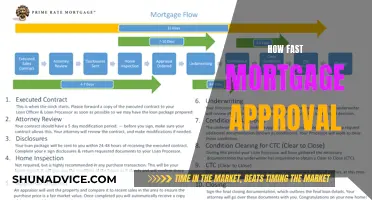
When applying for a mortgage, the lender will look into your credit history, finances, and the property in question to determine if you are a responsible borrower and can make your monthly payments on time. This process, known as mortgage underwriting, is used by lenders to decide a borrower's eligibility for loan approval. So, how far back do mortgage underwriters look?
| Characteristics | Values |
|---|---|
| Credit history | Mortgage underwriters will look at your credit history, including your credit report, credit score, and payment record. Most lenders will look as far back as 6 years when assessing your creditworthiness. |
| Income | Underwriters will review your income to assess your ability to repay the loan. They may look at your bank statements from the past 2-3 months, or 12-24 months if you're self-employed. |
| Outstanding debts | Underwriters will consider your outstanding debts, including your LTV (loan-to-value) ratio, which is the amount you're borrowing divided by the property's value. |
| Property history | Underwriters will research the property's history to ensure it can be legally transferred to you and to reduce the risk of future title problems. They will also consider the property's value and whether it aligns with the purchase price. |
| Deposit | The amount you've saved for a deposit will influence the terms of your mortgage. Underwriters will look at the source of your deposit to ensure it's legitimate. |
| Property type | The type of property you're looking to purchase will influence the amount you can borrow. Lenders generally prefer properties that conform to building regulations and safety standards. |
| Age | Underwriters will consider your age and how close you are to retirement when assessing your application. |
What You'll Learn

Credit history
Lenders typically focus on the last two to three years of your credit history, although some may go back as far as seven years to gain a comprehensive view of your financial patterns. They pay close attention to late payments, missed payments, or defaults within this timeframe. Additionally, they consider factors such as your income, outgoings, debt-to-income ratio, credit utilisation, and address stability.
Adverse information, such as late or missed payments, usually remains on your credit report for up to six years. After this period, it should be removed from your report, and lenders will not have access to it. However, some lenders may ask if you have ever experienced bankruptcy or had a County Court Judgment (CCJ) when you fill out your mortgage application, even if it occurred more than six years ago.
It is important to note that different lenders have varying standards and criteria for assessing creditworthiness. While high street lenders often require years of good to excellent credit, subprime adverse credit lenders may be more lenient and accept applications from individuals with lower credit scores or shorter credit histories. These lenders typically offer mortgages at higher interest rates to compensate for the increased risk they perceive.
To improve your chances of securing a competitive mortgage deal, it is advisable to maintain a good credit history and ensure a longer duration since any adverse credit events. Regularly monitoring your credit report and addressing any negative items before applying for a mortgage can help you identify areas for improvement and present yourself as a more attractive borrower to lenders.
Mitigating Risk: Strategies in the Mortgage Industry
You may want to see also

Property history
Lenders will also consider the property's location and whether it is in an area with a high risk of natural disasters or other risks that could affect the property's value. They may also consider the property's condition and whether any repairs or improvements are needed. If you are buying a property with a history of problems, such as flooding or structural issues, this may affect your ability to get a mortgage.
Lenders will also want to see that you have a stable address history and may ask for proof of residence for a certain number of years. This is to ensure that you have a stable living situation and are not at risk of defaulting on your loan.
Additionally, lenders will consider the property's value and whether it is in line with the amount you are requesting to borrow. They may require a professional valuation of the property to ensure it is worth the price you have agreed to pay.
While there is no definitive answer to how far back lenders will look into a property's history, they will typically focus on the most recent information. Keeping all records of the property's history and any maintenance or improvements is a good idea to provide to potential lenders.
Gifts, Mortgages, and Parental Money: Impact and Insights
You may want to see also

Income
Mortgage underwriters will look at your income to determine if you can make your monthly mortgage payments. They will also consider your income in relation to your other debts and outgoings. Most lenders follow a rule of thumb that mortgage payments should not exceed 28% of your gross income.
To verify your income, underwriters will typically ask for one to two years of tax returns. They will also request additional documentation, such as pay stubs for the last two to three months, W2 forms, profit and loss statements, and bank statements. They do this to check if your stated income matches the income reported and to verify your employment status with your employer. If your income is dependent on bonuses and commissions, underwriters will need to see two years' worth of this income to consider it part of their income evaluation.
If you are self-employed, the requirements are more challenging. You will typically need to provide two years of income from your business, including profit and loss sheets, balance sheets, and personal and business tax returns. Self-employed applicants should also be prepared to show at least a year's worth of business accounts, and often more, to demonstrate stable income.
Underwriters will also consider significant life events, such as graduating from school, switching careers, or starting a business, which may have impacted your income. They will assess your financial health by looking at deductions, areas of concern, and any undisclosed debt payments. They will also evaluate your financial reserves, including investments, assets, and savings.
Understanding the Mortgage Process: A Step-by-Step Guide
You may want to see also

Debts
When it comes to your debts, mortgage underwriters will look at your credit history, income, and any outstanding debts to assess your creditworthiness and whether you can afford the loan. They will also consider your debt-to-income ratio (DTI), which is the ratio of your debt obligations to your income. A high debt-to-income ratio can be a reason for mortgage underwriters to deny your application.
Mortgage underwriters will typically request bank statements covering the most recent two to three months. They will also look at your credit history, which includes your payment history, credit score, and outstanding debts. Lenders use your credit score to gauge how well you have managed your finances in the past and whether you are a reliable borrower. They will scrutinize your payment history for late payments, missed payments, or defaults.
The timeframe for reviewing your credit history can vary, but most loan officers will look at the last two to three years. Some lenders may go back as far as seven years to gain a more comprehensive picture of your financial patterns. It is important to note that different lenders have different standards for how far back they will examine your financial history. Therefore, maintaining good credit records for an extended period is essential to meet the requirements of various mortgage lenders.
Additionally, mortgage underwriters will evaluate your financial liabilities and assets, including retirement accounts, brokerage accounts, savings accounts, investments, and cash reserves. They will also consider your financial reserves to assess your ability to afford the loan. It is crucial to be honest about your finances when applying for a mortgage, as lying can lead to disqualification or a higher interest rate.
Zillow's Mortgage Estimate Secrets: What You Need to Know
You may want to see also

Deposit
When it comes to deposits, mortgage underwriters will assess your financial situation and eligibility for a loan. They will look at your bank statements to verify your financial health and credibility, including your income, spending habits, and ability to manage money responsibly. The number of bank statements required can vary, but typically, underwriters will request statements from the last two months. These statements help determine if you have sufficient funds for the down payment, closing costs, and future monthly mortgage payments.
It's important to note that large deposits may require additional explanation. Underwriters want to ensure that the funds in your account are sourced and seasoned. Sourced means that the origin of the money is clear and justifiable, while seasoned refers to the funds being in your account for a minimum period, typically at least 60 days. Any unusual deposits may need to be explained in writing, and providing letters of explanation for large deposits can be helpful.
For self-employed individuals or business owners, the requirements may be more extensive. Lenders may request bank statements going back 12 to 24 months or even longer to demonstrate a stable and reliable income. This extended period allows underwriters to assess your financial stability and ability to consistently generate income.
To increase your chances of mortgage approval, it's advisable to maintain a good credit history and keep your debt in check. Lenders will consider your debt-to-income ratio, and taking on additional debt before applying for a mortgage may negatively impact your application. It's also essential to be transparent about the source of your deposits to avoid any concerns regarding potential criminal or fraudulent activity.
Lastly, don't hesitate to seek advice from a mortgage loan officer or financial adviser. They can provide valuable guidance and help you navigate the mortgage application process, ensuring you have all the necessary documentation ready.
Switching Mortgages: A Guide for Going Against Parents
You may want to see also
Frequently asked questions
Mortgage underwriters look into your credit history as far back as 6 years. This is because any adverse information, such as a County Court Judgement (CCJ) or bankruptcy declaration, stays on your credit report for 6 years. However, most underwriters will focus on your recent credit activity as an indication of your current financial situation.
Mortgage underwriters look for clues in your credit history that will help them predict your ability to pay back what you borrow. They will look at your credit report, credit score, and payment records to determine if you are a responsible borrower and if you are likely to make your monthly payments on time.
Mortgage underwriters also consider your income, any outstanding debts, and the LTV (loan-to-value) ratio of your mortgage. They will usually look at the past 2-3 months of bank statements and may look further back, from 12-24 months, if you are self-employed. They will also consider the value of the property you are looking to purchase and how close you are to retirement.







